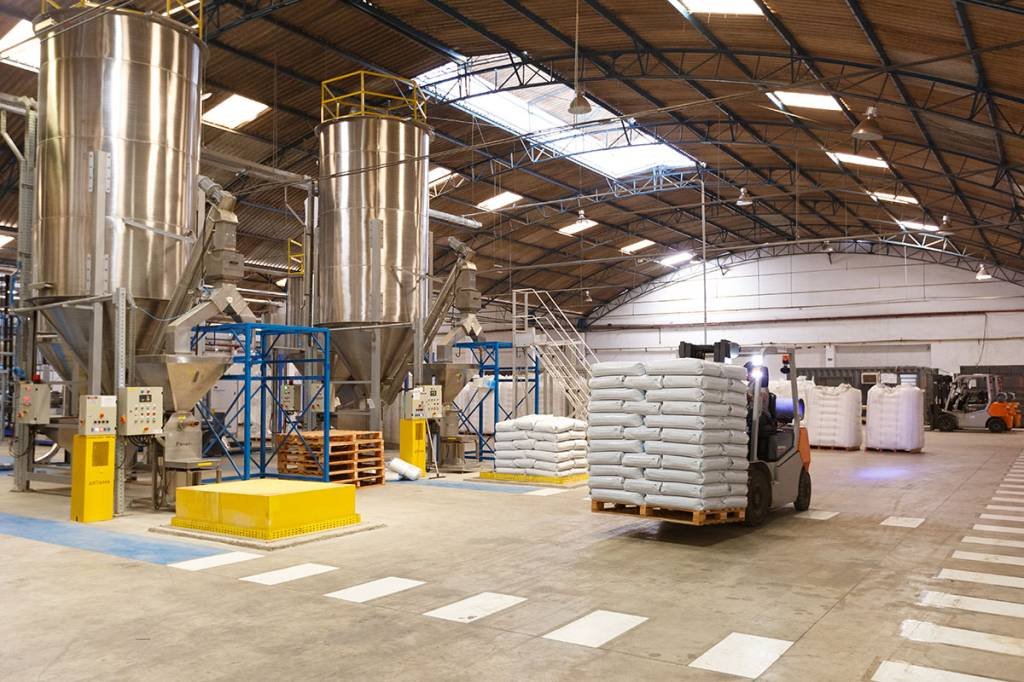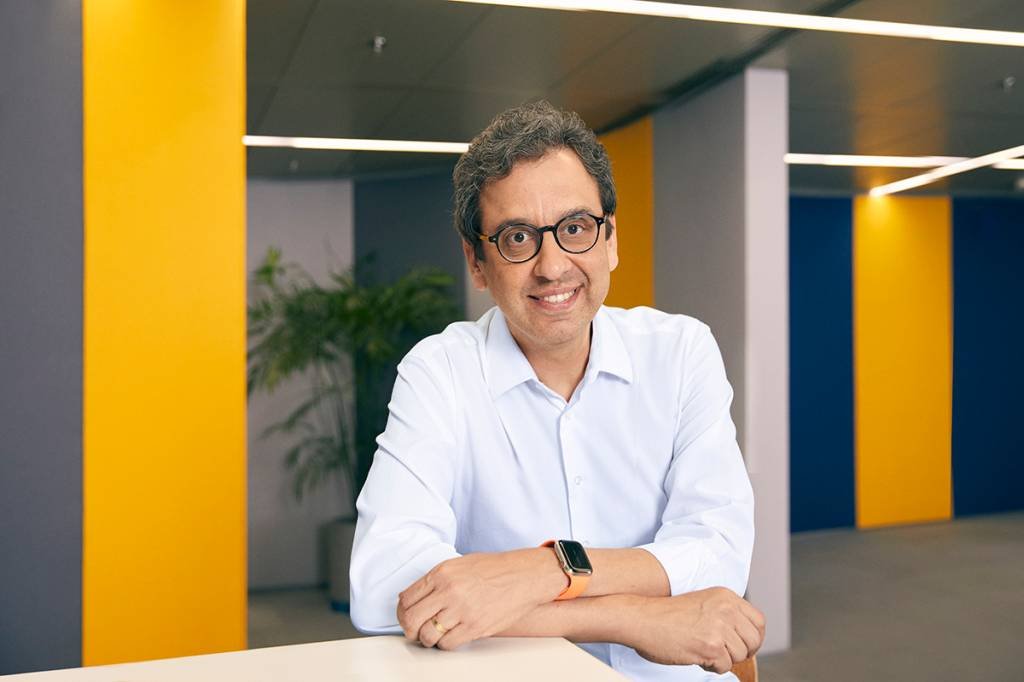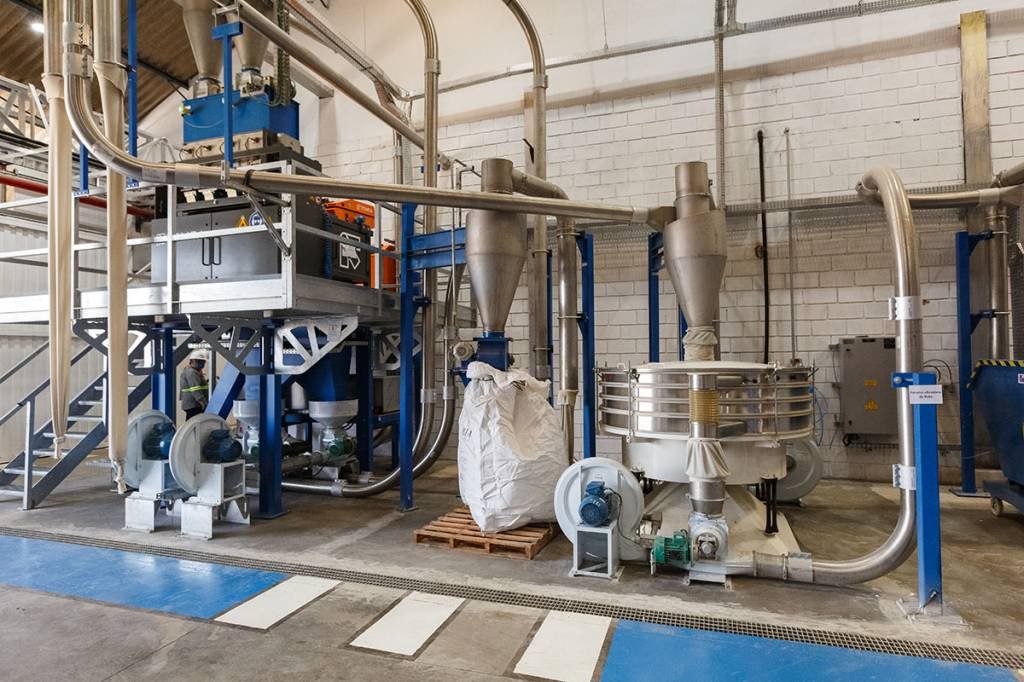The 2023 Integrated Report is now available. In it you can see our results, initiatives and progress over the...
Braskem inaugurates its first mechanical plastic recycling plant
DATE: 03/16/2023

Operating since March, the unit received an investment of BRL 67 million and is capable of reinserting 250 million plastic packages per year into the production cycle
A global leader in the production of biopolymers on an industrial scale, Braskem is taking an important step towards meeting the goal of expanding its portfolio of products with recycled content to reach 1 million tons of these products by 2030.
This is the inauguration of the first mechanical recycling unit in Indaiatuba (SP), the result of a partnership between the company and Valoren , a company that develops technology and manages waste to transform it into recycled products.
With an investment of R$67 million, this new Braskem facility went into operation in March of this year, in a complex that has 9,000 square meters of built area, where more than 150 employees work.
This unit will be able to transform, each year, 250 million post-consumer plastic packages made of polyethylene and polypropylene – present in cleaning material, personal hygiene, cosmetics and food, for example – into 14 thousand tons of post-consumer recycled resin. consumption with high quality.
The resins, in turn, will be reused as raw material by the manufacturing industry and will reach the consumer through new products, such as furniture, secondary packaging, gardening and painting items, among others.
In the following interview, Edison Terra, Vice President of Olefins and Polyolefins at Braskem in South America, presents the details of this new unit – and highlights Braskem’s commitment to the best sustainability practices for the benefit of the environment. Check out:

Edison Terra, vice president of Braskem: purpose of improving people’s lives by creating sustainable solutions (Braskem/Press Release)
What types of plastic products is this Indaiatuba unit capable of recycling?
The mechanical recycling plant in Indaiatuba, the result of a partnership between Braskem and Valoren , processes mostly household waste, considering rigid polyethylene (PE) and polypropylene (PP) material, such as food packaging, cleaning material , personal hygiene products and cosmetics.
What technology do you use in the recycling process?
The technological aspects were one of the great challenges of this new project. The recycling line is made up of a modular complex, which integrates different stages and was developed with Braskem’s own know-how . The plastic waste placed at the beginning of the line goes through the grinding, washing, extrusion and homogenization processes.
The arrangement of the project is unprecedented and the machinery uses state-of-the-art European technology, complemented by national equipment.
Among the differentials of our first mechanical recycling plant are the high-performance washing line, with an optical selector to remove contaminants by color and by type of material, the homogenizing silos, the high-precision additive and input dosing systems and the module for odor elimination and high-performance polymer filtration, which contributes to the quality of the final plastic.
Finally, we couldn’t build a plant without considering, in addition to people’s safety, the best sustainability practices in its infrastructure. That is why we carry out recirculation water treatment to optimize water and energy resources.
How does the inauguration of this plant fit into Braskem’s ESG strategy?
At Braskem, our mission is to improve people’s lives by creating sustainable chemical and plastic solutions. The inauguration of this unit represents part of the materialization of this purpose.
Our transition strategy to the circular economy is strongly based on mechanical and advanced recycling solutions. In the case of mechanical recycling, we continue to work in partnership with other links in our chain to strengthen this process, overcoming technical and logistical barriers to ensure quality and quantity recycled material.
However, it is important to stress that everything starts with conscious consumption and the proper disposal of plastic, often in people’s homes. Through proper disposal and selective collection, this waste can reach our unit and return to the plastic production cycle, as a high-quality raw material for new sustainable products.
That is, we are building a path to add value to plastic waste, which often ends up being diverted from the collection system to the environment, oceans and rivers.

Braskem unit in Indaiatuba, in the interior of SP: machinery uses cutting-edge European technology, complemented by national equipment (Braskem/Disclosure)
![]()
What are Braskem’s long-term recycling goals and how will the company achieve these goals?
Braskem’s commitment, approved by the board of directors, is to reach 1 million tons of products with recycled content by 2030. In addition, we also have the ambition to be recognized worldwide as a company that develops the recycling value chain in the regions where operates and to be leaders in recycling in the Americas.
To meet our goals, we intend to work through partnerships with other companies in our value chain to strengthen mechanical and advanced recycling globally, as well as educate, raise awareness and engage society about proper disposal, conscious consumption and the importance of the recycling process. recycling. The inauguration of the mechanical recycling plant is one of several Braskem initiatives to meet these goals, which will be announced in the coming months.
What else is planned beyond this project?
In February, we announced an agreement for the construction of an advanced recycling unit, also in partnership with Valoren , and the creation of Cazoolo , a center for the development of sustainable packaging, which will help us to meet these objectives within the timeframe we stipulated, in addition to of being complementary initiatives to this mechanical recycling plant. Together, the three projects represent an investment of approximately R$ 130 million.
Through these three important fronts, we want to close the circle of the circular economy and improve the processes and paths related to the recycling of plastic waste in Brazil and in the world.
When will these new units be ready?
Braskem closed another agreement with Valoren for the construction and installation of an advanced recycling unit, also in Indaiatuba. It will transform, through the pyrolysis process, mechanically non-recyclable plastic waste into certified circular raw material, which will be used to manufacture new products with the same quality as virgin ones , whether resins or chemicals.
This new unit, which involves a joint disbursement of BRL 44 million, should start operating in the first quarter of 2023 and will have the capacity to produce 6 thousand tons of circular products per year.
Also in the first half of 2022, Braskem plans to open Cazoolo , its packaging development center for the circular economy. The innovation hub, which will operate in the west zone of São Paulo, will connect customers, designers, brand owners , startups and universities with the aim of developing more sustainable packaging through improvements in design and their journey, from conception to post-consumption.
This new center is the result of an investment of approximately R$ 20 million, considering its facilities and state-of-the-art equipment, which will be used in the creation of prototype packages. All of this with a view to accelerating the advancement of packaging circularity and generating less environmental impact.
Where else does Braskem invest in recycling plants?
The company is looking at recycling in all regions where it operates, South America, North America and Europe. What I can anticipate is that we have signed a cooperation agreement with Alcamare , the largest recycling company in Mexico, for the production of resins made from recycled material for packaging food products.
In addition, Braskem supports Plastix – a Danish company dedicated to the recycling of plastic material, specializing in separating and recycling plastic fiber waste from the maritime sector – in its effort to recycle fishing nets and other plastic fibers for use at sea. Braskem joined forces with the company to help it optimize the recycling process, providing technical and commercial support.
Also in Europe, we participate in Nextloop , an award-winning program developed since 2020 by the environmental consultancy Nextek , from London, which has an ambitious and necessary objective for the circular economy of plastic: to create the first food-grade recycled polypropylene ( FGrPP – food-grade recycled polypropylene ) from post-consumer waste.
In the United States, in February, we announced the purchase of shares in Nexus, a local leader in advanced recycling technology for converting hard-to-recycle plastics into circular raw material for the production of resins with the same quality as virgin ones.
Also in the region, we expanded our portfolio of circular polymers, with the inclusion of resins with post-consumer recycled content for use in food packaging. It is important to reinforce that these new products comply with the Food and Drug Administration (FDA).
What results does investing in and practicing the circular economy bring to Braskem’s investors and stakeholders in the short, medium and long term?
In November 2018, we publicly made a commitment to benefit the circular economy, inviting other players in the chain to do the same.
This commitment, which evolved in 2020 into a carbon-neutral circular economy, places Braskem as part of the solution, working with all stakeholders to transform the linear economy into a circular one, where society’s needs are met by more efficient materials, processes and systems. sustainable and circular innovations.
Consumers, for example, are more aware of the products and services they purchase and have sought sustainable solutions and technologies for their daily lives. In addition, there is a great movement by companies to encourage ESG practices, as investors also present this demand and are more willing to invest their resources in companies that have this purpose and show it in practice.
We believe that sustainable development and innovation are the foundations of Braskem’s operations and, in this sense, we constantly invest in the technological improvement of our processes.
In our view, investing in the advancement of technology is the central path in the search for a more sustainable future, and we see our R&D investments as a tool for the structural challenges that will enable the energy transition to a fairer, more circular and carbon neutral economy. . And our initiatives are also an invitation to those who want to join Braskem on this journey.

Originally published in Exame Magazine, visit: Braskem inaugura sua primeira planta de reciclagem mecânica de plástico | Exame



No comments